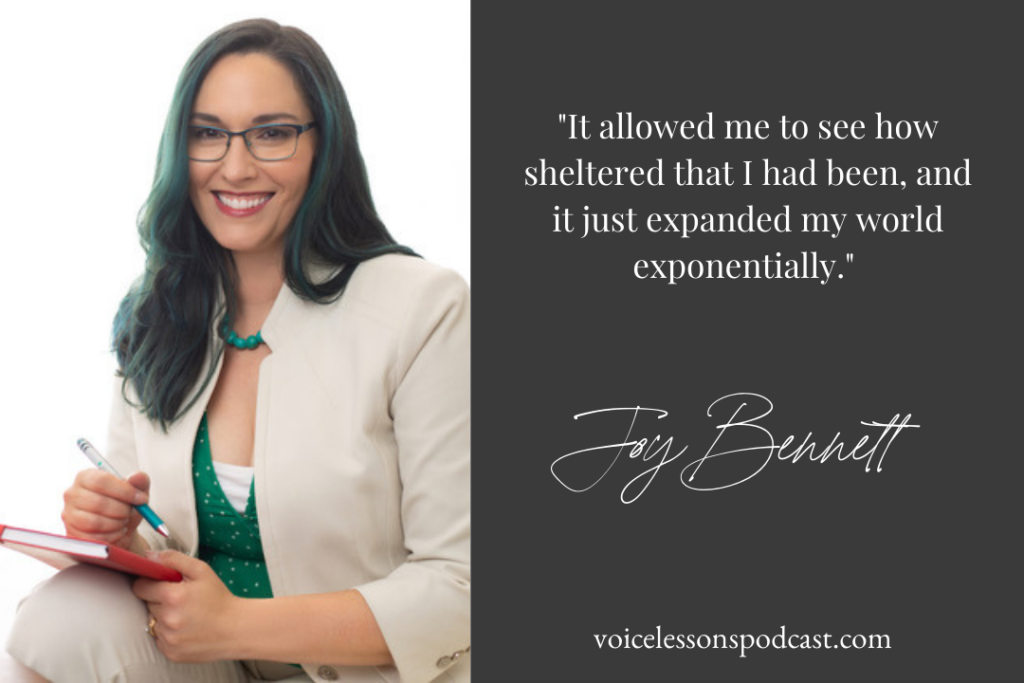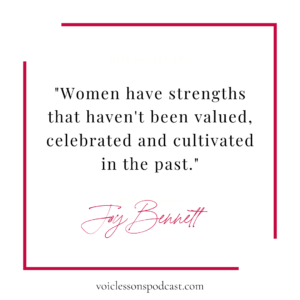https://oembed.libsyn.com/embed?item_id=16169828
Author, speaker, and activist Joy Bennett shares a story no parent can ever imagine being a part of. What happened to Joy and her family was the beginning of her spiritual transformation. This is the story of a woman who shifted from intellectual know it all, to a questioner. Listen to how she healed her unbelief in this episode in “faith”.
 Joy Bennett is a marketing and communications strategist, founder of Jumpstart Marketing, local community activist, and author of the upcoming book “Holding On While Letting Go.” She loves listening to other people’s stories and helping both individuals and organizations tell their stories with clarity. She and her husband Scott have been married since 1998 and together have 4 children, 3 living. They live near Cincinnati, Ohio, with their 3 kids, 2 cats, and 2 relentlessly optimistic dogs.
Joy Bennett is a marketing and communications strategist, founder of Jumpstart Marketing, local community activist, and author of the upcoming book “Holding On While Letting Go.” She loves listening to other people’s stories and helping both individuals and organizations tell their stories with clarity. She and her husband Scott have been married since 1998 and together have 4 children, 3 living. They live near Cincinnati, Ohio, with their 3 kids, 2 cats, and 2 relentlessly optimistic dogs.LISTEN: APPLE PODCASTS | STITCHER | SPOTIFY
TOPICS DISCUSSED IN THIS EPISODE:
- The foundation Joy found for her career as a writer
- The moment that changed everything for her and her family
- The strength and bravery of her daughter, Elli
- The importance on helping people get a clear message in writing
- How we lead with the experiences we have had, good or bad
- How Joy continued to move forward and embody “Joy”
- How Joy’s faith helped her through the grieving process
- How to grieve after the loss of a child
- Medicine and mental illness is not accepted in some religious circles
- The mental permission Joy have herself to seek and accept health
- How to find faith in when life throws you a curveball
- Creatives transform their pain for good
- The clarity Joy got about life from her daughter
- How to share a perspective and life experience with others in a way to create impact
- Why Joy decided to run for office
- We can build a society that supports all of us, even when we have different perspectives
- How Joy’s experience as a parent with birth defects helped prep her for being a translator for people with different experiences and ideas, in turn bringing them together
- How Joy dealt with becoming more visible to the world during her campaign
- Women look at the bigger picture and lead differently with that holistic way of thinking
RESOURCES/ADDITIONAL INFORMATION:
Pre-order Holding on While Letting Go by Joy Bennett
#LESSONUP:
- (5:02) But working with those specialists, we were able to see that she had cognitive function and they said she had a really great sense of humor. She would laugh. And we were able to create a communication device. And it was like a precursor to the iPad where we could set up buttons on a screen that would sit speak things out loud.
- (22:05) This analogy really was helpful to me. It said that when we break a bone, we wrap it and immobilize it in a cast to allow it to heal and regain strength. And then you take the cast off and hopefully your functions back and medication can be like that. Especially antidepressants. It can be that cast to hold you while you heal. And while you regain strength and sometimes you can walk away and you don’t need it anymore after a period of time. And sometimes you still need support.
- (24:26) And so I ended up discovering that it was about what she taught us and how she helped me and Scott, my husband be better people. She gave us perspective on what’s important and what isn’t. When she was born and we learned about all of the things that she needed, it basically completely wiped our life slate clean, and we only could put onto it what was truly important. And for a long time, it was just taking care of her. And then eventually we were able to add some things in again. And I remember I’d walk down a hallway in school or pass other parents at a park or something and over here, snippets of conversation and think there’s so much energy being spent on things that don’t matter in the long run. And I think that Ellie just gave us this crystal clear way of seeing that that “I only have so much time. I only have so much energy. Where do I want that to go? What do I want to do with that?”
- (26:55) It allowed me to see how sheltered that I had been, and it just expanded my world exponentially.
- (29:26) I’m in a Midwestern state that’s considered a swing state when it comes to national elections. And I grew up conservative, anti-abortion all those things. And as my perspective broadened, and as I learned more about the circumstances that many people are in and live from and how my, my experience is just one of many, I started one of the strengths that we have in our country is all of those different stories. And I can only see from my vantage point. And so I have these huge blind spots. I’ve never been in that situation. I had a family who stayed together. I have a very unique view and it is one of thousands. And if I see that as a strength that other people can see things differently, or other people can see things that I had no idea were even there. And if we listen to each other, then we both see more and we could build a society that serves and supports all of us. And I, I don’t know. I think one of the things that is wired into me is this like ability to see what could be, and then the drive to make it happen. So, so when I encounter people who are like, well, that’s just how it is. I’m like, no, I have to be that way.
- (33:50) When we come together and we work together to problem-solve and say, okay, taking into account things that you’ve said, and the things that we have, how can we make this work for all of us that perspective? I talked about it a lot when I was campaigning.
PIN IT:


Comments +